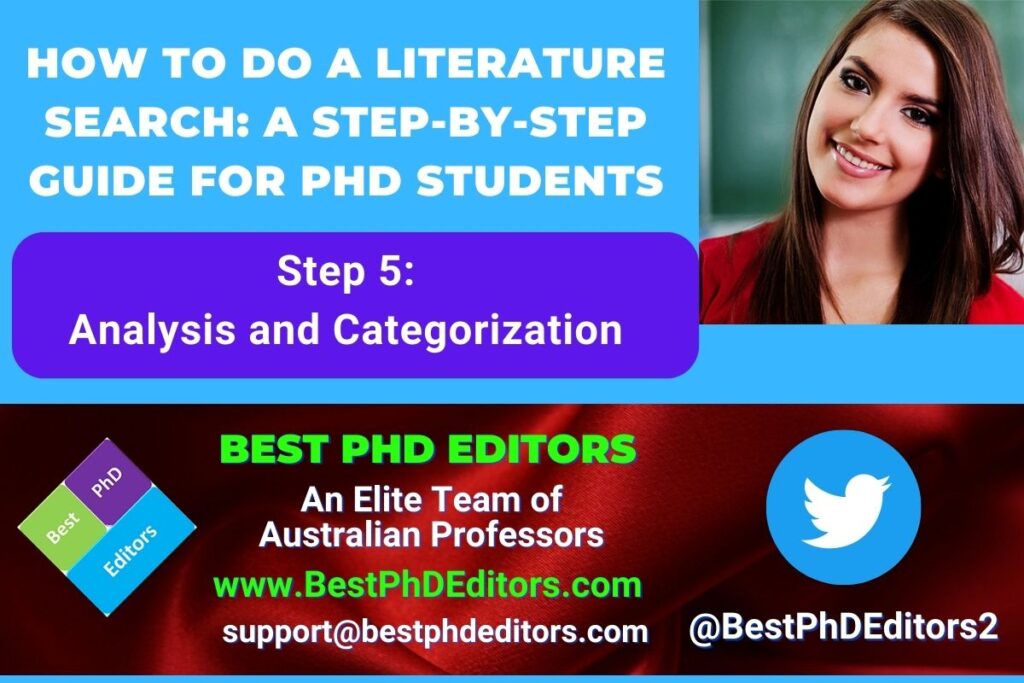
How to Do a Literature Search: A Step-by-Step Guide for PhD Students

Literature Search: An Introduction
A literature search is a critical component of any research project, as it helps to identify what research has already been conducted and provides a foundation for your own research. Conducting a comprehensive and thorough literature search is important for ensuring the validity and reliability of your research. This tutorial article will provide guidance for PhD students studying at Australian and UK universities on how to conduct a literature search for their research projects.
Literature Search Step 1: Defining Your Research Question
The first step in conducting a literature search is to define your research question. Your research question should be specific, focused and guide your search for relevant literature. For example, if your research focuses on the impact of technology on education, your research question could be “What is the effect of technology on student learning outcomes in primary schools?”. You should also check out an excellent tutorial from Monash university on developing research questions.


Literature Search Step 2: Identifying Keywords
Once you have defined your research question, the next step is to identify keywords related to your research question. These keywords will be used to search for relevant literature in academic databases, journals, books, and reports. For example, some keywords for the research question above could be “technology”, “student learning outcomes”, “primary schools”.
Literature Search Step 3: Selecting Databases
The next step is to identify relevant academic databases, journals, books, and reports to search for literature. Some commonly used databases for literature searches include JSTOR, Google Scholar, and Web of Science. These databases contain a wealth of information, including peer-reviewed articles, books, conference proceedings, and other types of academic publications.


Literature Search Step 4: Searching for Literature
Once you have identified the relevant databases, use your keywords to search for literature. It is important to use a systematic approach to searching for literature, as this will ensure that you are comprehensive and thorough in your search. Some tips for searching for literature include:
- Using boolean operators (e.g. AND, OR, NOT) to narrow down your search results
- Using quotation marks around keywords to search for exact phrases
- Searching for both the keywords and the synonyms of the keywords
- Limiting the search to peer-reviewed articles or a specific date range
Literature Search Step 5: Analysis and Categorization
After collecting a sufficient amount of literature, the next step is to analyse and categorize the literature. This involves grouping similar studies together based on their findings, methods, and contributions to the field. For example, if your research question focuses on the use of technology in the classroom, you might categorize studies based on the type of technology used (e.g. laptops, tablets, etc.), the age group of students, and the type of educational setting. This will help you see trends and identify key themes that will inform your research proposal.


Literature Search Step 6: Evaluation of the Literature
It is important to evaluate the quality of the literature that you have reviewed. This involves considering factors such as methodology, sample size, and validity of results. You should critically assess the strengths and limitations of the studies you’ve reviewed, and consider how these impact the validity of their conclusions. For example, a study with a larger sample size and more rigorous methodology is likely to be more reliable and generalizable than a study with a small sample size and less rigorous methodology.
Literature Search Step 7: Referencing the Literature
It is also important to keep track of the literature you have reviewed during the process of your literature search. This will help you to easily access the articles and documents you have used in your research, and to accurately cite the sources in your final research paper. Some commonly used referencing styles include APA, MLA, and Harvard. Make sure to check the guidelines of your department or institution to determine which referencing style is appropriate for your research project.


Literature Search Step 8: Organizing Your Literature Review
Once you have conducted your literature search, analysed and evaluated the literature, and kept track of your references, it is time to organize your literature review. A literature review should provide a comprehensive overview of the current state of knowledge in your field of research, and should highlight the key findings and themes that have emerged from previous research.
When organizing your literature review, it is important to:
- Write in a clear and concise manner, using an appropriate academic writing style.
- Use headings and subheadings to help structure your review and make it easy to follow.
- Summarize the key findings and conclusions of each study, and highlight the strengths and limitations of each study.
- Synthesize the results of multiple studies to identify trends and patterns, and to provide a broader understanding of the current state of knowledge in your field.
In the process of conducting a literature search for your PhD, it’s crucial to know how to structure a literature review effectively. Additionally, our guide on literary reviews offers further insights into this topic.
In conclusion, conducting a literature search is a crucial component of any research project. By following the steps outlined in this tutorial article, PhD students studying at Australian and UK universities can ensure that their literature search is systematic, comprehensive, and thorough. Remember to keep track of your references, organize your literature review, and to critically evaluate the quality of the literature you have reviewed. With these tips, you can be confident that your literature search will provide a solid foundation for your research project.
If you need more help, you can benefit greatly from the PhD Literature Review Writing Services and Dissertation Methodology Writing Services offered by our respected Australian professors.
Most Useful Guidance for PhD Students
How to Write a Successful PhD Proposal for Australian Universities: Learn with Examples
Writing a Successful PhD Proposal for UK Universities: Tips and Examples
PhD Proposal Examples: Uncovering the Secrets to a Winning Proposal
NVIVO: A Step-by-Step Guide to The Data Analysis Software
NVIVO Coding: A Step-by-Step Tutorial
9 Easy Examples of Qualitative Data in Research
Dissertation Methodology Examples for PhD: Methodology Writing Made Easy
Dissertation Methodology Writing Decoded: Learn the Steps with Easy Examples
Binary Logistic Regression in SPSS: Learn the Steps with Easy Examples
Multiple Linear Regression using SPSS: Learn with Easy Examples





Pingback: Literature Review Example: The Correct Way To Write And Structure The Literature Review For Your PhD Thesis